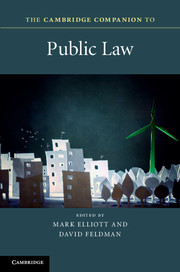Book contents
- Frontmatter
- Contents
- Notes on Contributors
- Introduction
- 1 The distinctiveness of public law
- 2 The politics of public law
- 3 The rule of law in public law
- 4 Legislative supremacy in a multidimensional constitution
- 5 The politics of accountability
- 6 Rights and democracy in UK public law
- 7 Public law values in the common law
- 8 Public law and public laws
- 9 Public law and privatisation
- 10 State architecture: subsidiarity, devolution, federalism and independence
- 11 Soft law never dies
- 12 The impact of public law litigation
- 13 Designing and operating constitutions in global context
- Index
- References
11 - Soft law never dies
Published online by Cambridge University Press: 05 September 2015
- Frontmatter
- Contents
- Notes on Contributors
- Introduction
- 1 The distinctiveness of public law
- 2 The politics of public law
- 3 The rule of law in public law
- 4 Legislative supremacy in a multidimensional constitution
- 5 The politics of accountability
- 6 Rights and democracy in UK public law
- 7 Public law values in the common law
- 8 Public law and public laws
- 9 Public law and privatisation
- 10 State architecture: subsidiarity, devolution, federalism and independence
- 11 Soft law never dies
- 12 The impact of public law litigation
- 13 Designing and operating constitutions in global context
- Index
- References
Summary
‘Soft law’ is a fact of public life. Cast in terms of competing demands for flexibility and responsiveness, and consistency and coherence, official business could not sensibly be carried on without, to adopt a generous working definition, rules of conduct or pointers and commitments which are not directly legally enforceable but which may be treated as binding in particular legal or institutional contexts. While the phenomenon is commonly associated with international governance, it has increasingly resonated in public law scholarship if under different labels. An uncodified constitution, famous since Victorian times for conventions of the constitution bearing on the behaviour of, and relations between, principal organs of the State, is a natural habitat.
Examining a range of usages, this chapter looks at soft law as an instrument for, and barometer of, constitutional and administrative development over the course of a lifetime. Reflecting and reinforcing the notion of legalisation in contemporary society, commonly observed in terms of more legislation and more jurisprudence, as well as more lawyers, it pursues the idea of ‘soft law abounding’. While naturally vulnerable to the growth of formal legal norms, soft law techniques are also apt to be stimulated by it, in part by way of supplement and/or experiment, in part by way of counter-reaction.
The pervasive sense of ambiguity, as also the broad spectrum of rules, agreements, communications, etc. familiarly in play, is the other main starting point. Putting to one side the simplistic view of polar opposites, an influential institutionalist model references different dimensions to legalisation, whereby law is characterised as ‘harder’ or ‘softer’ according to the degree and precision of the obligations created, as well as the extent of involvement by a court or tribunal. Factors which point in a particular direction, a strong demand for authoritative interpretation and/or the constitutional symbolism of formal law perhaps, or conversely a preference for experimentation or ‘learning by doing’, may then be identified in functionalist fashion. It is well to remember, however, that while the choice of soft law technique will often be mundane, it may on occasion be a matter of significant political and/or legal dispute.
- Type
- Chapter
- Information
- The Cambridge Companion to Public Law , pp. 215 - 235Publisher: Cambridge University PressPrint publication year: 2015
References
- 3
- Cited by

